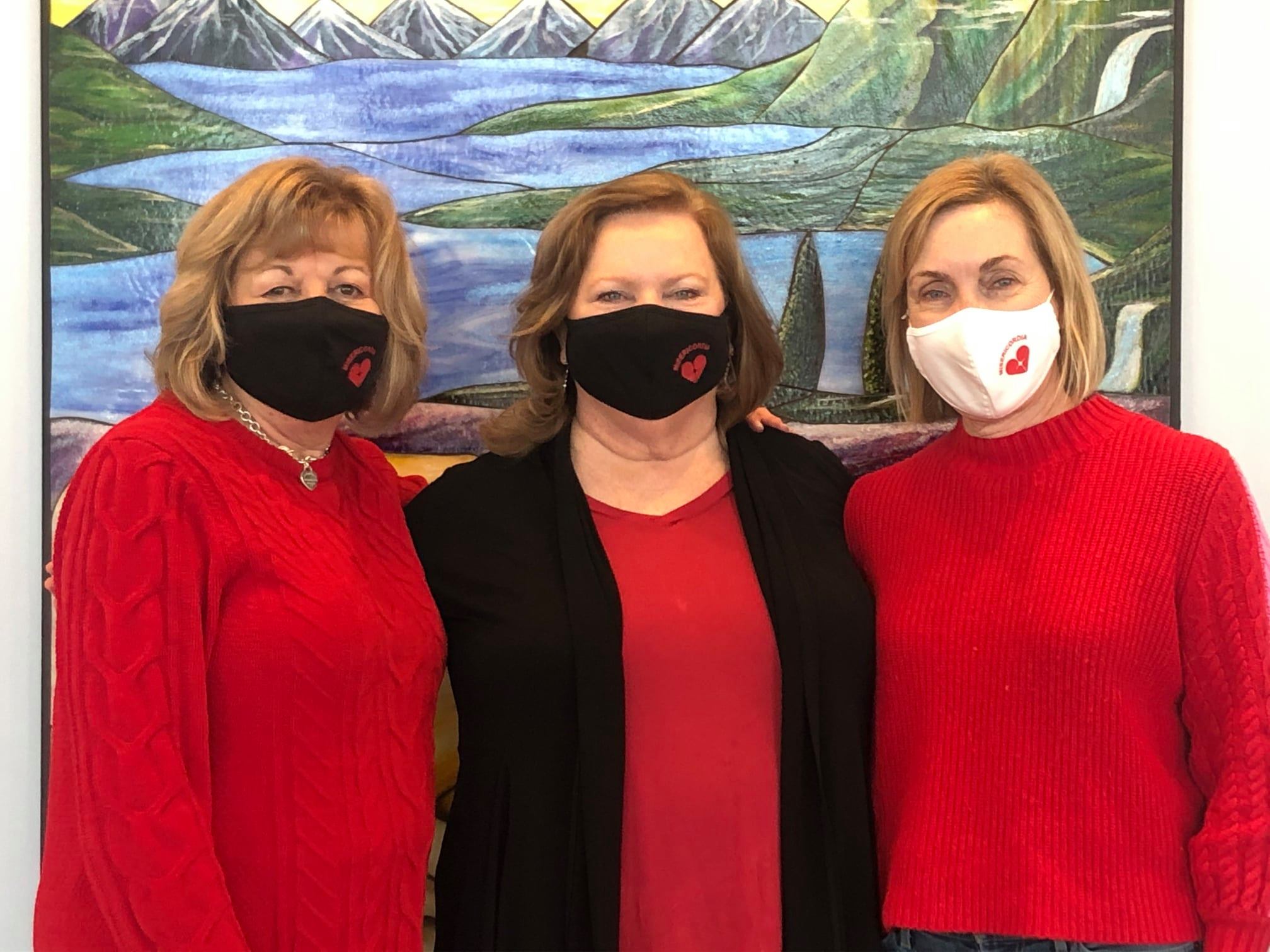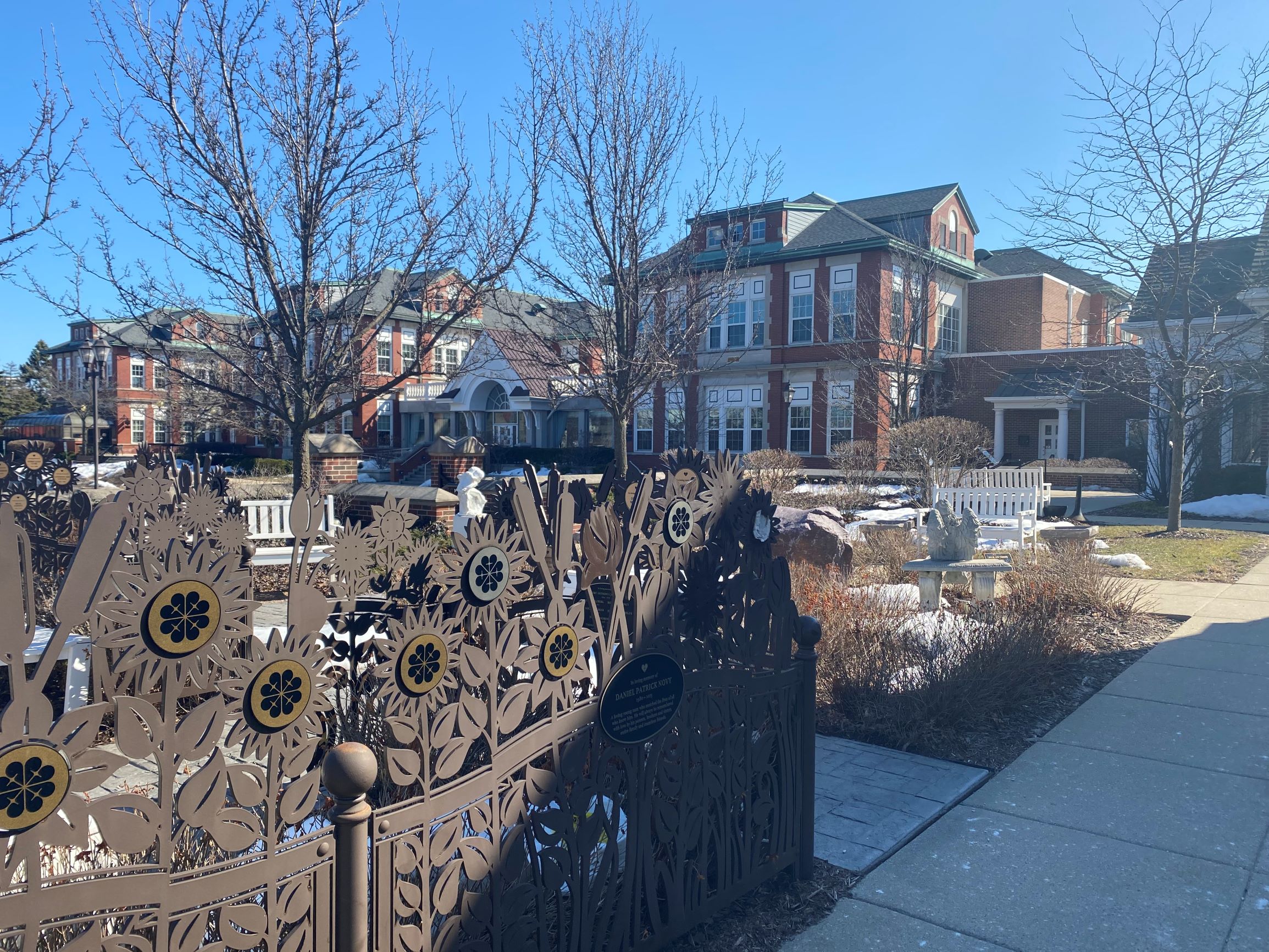![]()
![]()


by Ernie Stark
Assistant Executive Director for Residents and Programs, Mary Pat O’Brien, is a person for whom family is paramount. Born in Evanston and raised in an Irish Catholic family, Mary Pat cherishes her relationships with her two brothers, two sisters, and their spouses and children. With eleven nieces and nephews, along with five great nieces and nephews, Mary Pat’s personal life is enriched by the familial love she gives and receives.
Early in her life, Mary Pat’s family moved and settled in LaGrange. Here Mary Pat attended St. Cletus Elementary School and Nazareth Academy during her high school years. She went to Bradley University in Peoria where she majored in Psychology. During her collegiate years, her future plans included early childhood care or childhood intervention care.


by Therese Burke
The Misericordia Women’s League’s annual Heart of Gold benefit may have looked a bit different this year, but the fun and enthusiasm was felt across the country.
With over 300 supporters tuning in all the way from New York to California, the virtual event, A Night at the Races, was a huge success, raising $725,000.
The evening featured celebrity drop-ins from actress and Chicago native Jane Lynch, Chicago athletes Connor Murphy and Jim Thome, local broadcast stars and even more special guests sharing their love for Misericordia.

Year after year, a dedicated team of charity runners supports Misericordia in ways that few others could ever imagine doing – running 26.2 miles through the streets and neighborhoods of Chicago to raise much-needed funds that benefit our children and adult residents.
From first-time marathoners to seasoned runners, each Misericordia Heartracer team member commits to raising between $1,250 and $1,750, depending on the date they register for the Bank of America Chicago Marathon. This year the event is tentatively scheduled for Sunday, October 10, pending Covid-19 restrictions.

by Scott M. Mendel
With a new administration in Washington, D.C., a number of legislative proposals are before Congress that could adversely affect Misericordia. There is also a new regulatory initiative in Springfield that can be detrimental to Misericordia’s future plans. Below is a brief summary of these federal and state initiatives. I am always happy to provide additional information or answer any questions. The best way to reach me is at scott.mendel@klgatescom.


by Ernie Stark
One of the areas of administrative responsibility of Associate Executive Director Father Jack Clair is campus security. Recently, I asked Father Jack about how Misericordia keeps staff and residents safe.
Over the past few years, many things have changed. Some are best kept confidential. Others are quite visible: Locked doors are now the rule throughout the campus not only on all residences, but the Ridge entrance, to areas beyond the Greenhouse Inn, business office and laundry. Elevator access requires ID activation. To enable staff to lock down areas if needed, many doors required new locks to be installed. Bullet proof glass has been installed at public entrances.
Dear TFC Members:
Senators Hassan, Casey, and Brown, and Representative Dingell, have circulated a draft bill called the Home and Community-Based Services Access Act (the “HAA”). They have asked members of the public to provide comments on the HAA. It is critically important that each of you send in your own comments on this proposed legislation.
The HAA is being portrayed as legislation that will help individuals with disabilities. Unfortunately, the way it is drafted, it will have a devastating effect on the men and women with the most significant intellectual disabilities. The bill would end any requirement that states provide the services of intermediate care facilities for individuals with intellectual disabilities (“ICF/IIDs”). It would also create a strong financial incentive for all states to close all ICF/IIDs, both state operated and private. 70,000 men and women across the country have chosen to live in ICF/IIDs because they have found that these settings best meet their needs and preferences. All of these men and women would be forced to leave their chosen homes.


Written by Ernie Stark
Consider the task: ensuring that 600+ residents have nutritious food that meet their individual needs. That’s the mission of the Food Services Department, led by Director Bob Noga, his assistants Jim Ahlfeld and Kyle Rhone, as well as Head Chef Sammy Johnson and Head Baker Freddy Fernandez. Food Services reports to Father Jack, who said “They do all the work.”
The task of feeding Misericordia residents is a complex job, which requires a great deal of organization. Think about the different types of residences on campus and the variety of residents’ needs. For example, some residents can eat typical food while others need their food pureed. Some have dietary restrictions. Some can eat independently, some cannot. Other residents receive tube feeding. There are almost as many specific needs as there are residents.
Two staff dieticians create recipes and plan the meals, meals that can be adapted in a variety of ways that meet the residents’ needs. Purchasing food and other supplies is also part of Food Services. In addition to three chefs and seven cooks, the kitchen staff includes those who prepare the food, scullery personnel and the drivers who deliver meals to the residences.


by Ernie Stark
Many of us have attended Mass with Father Jack or seen him at various campus events. Did you know that Father is responsible for several departments that keep Misericordia running? These include Food Services, Maintenance and Security. Look for subsequent articles about these important departments.
Most of us do not know Father Jack’s personal story or what brought him to Misericordia. Let’s hear that in Father’s own words.
“I was adopted by an Irish Catholic family on the Northwest side of Chicago. My father was a Chicago policeman who grew up on the South side. One of his police duties was to be a crossing guard at a public school where my mother taught kindergarten. That’s where they met. In their 30s, they found out that they were unable to have children. They went to Catholic Charities where they adopted my sister, Sheila, and several years later they adopted me.
Dear Misericordia Families:
We are asking you to take action by submitting a comment to the Illinois Department of Human Services regarding proposed rule changes that will prevent campus settings and other types of congregate settings in Illinois from receiving Medicaid waiver funding. These rule changes will not directly affect any of Misericordia’s current homes because its campus homes receive Medicaid funding that is reserved for intermediate care facilities for the developmentally disabled (ICFs) and its off-campus CILA homes meet the requirements of the proposed rule. Nonetheless, the rule changes described below can limit housing options that Misericordia may wish to pursue in the future. In addition, we feel strongly that men and women who wish to live in a campus setting, on a farmstead, or in other types of intentional communities should have that opportunity. Under the proposed rule changes, only small isolated group homes in neighborhoods will be eligible to receive Medicaid waiver funding. We know that for some men and women, these small group homes can be very isolating. Some men and women have behavioral issues that preclude them from living in a small group home in an urban neighborhood; they do much better in the calm of a campus setting or a farm community. If men and women find that they prefer to live in a campus setting, on a farmstead, or in another intentional community with their peers, and if that type of setting best meets their needs, they should have that option. The proposed rule changes take that option away in Illinois. In addition, the proposed rule seeks to impose restrictions on where individuals with disabilities may live that are not imposed on any other group. This is wrong and likely unlawful.
Here are some key provisions of the Social Security Act that support choice, particularly the choice of an ICF. Please click the "Medicaid Provisions" below.
Page 37 of 39